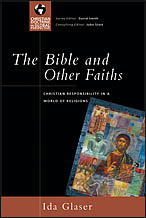Click to join the conversation with over 500,000 Pentecostal believers and scholars
Click to get our FREE MOBILE APP and stay connected
| PentecostalTheology.com



 Ida Glaser, The Bible and Other Faiths: Christian Responsibility in a World of Religions, Christian Doctrine in Global Perspective, Series Editor, David Smith, Consulting Editor, John Stott (Downers Grove, IL: InterVarsity Press, 2005), 255 pages.
Ida Glaser, The Bible and Other Faiths: Christian Responsibility in a World of Religions, Christian Doctrine in Global Perspective, Series Editor, David Smith, Consulting Editor, John Stott (Downers Grove, IL: InterVarsity Press, 2005), 255 pages.
The Bible and Other Faiths ably brings together a unique set of concerns which aren’t often considered together under a single cover. Author Ida Glaser is Academic Director of the Centre for Muslim-Christian Studies in Oxford and an Associate Tutor at Wycliffe Hall, Oxford. Previously she was a Senior Teaching and Research Fellow at the Edinburgh Centre for Muslim-Christian Studies and on staff at Crosslinks, an Anglican mission society. Her expertise focuses on areas of Islam, interfaces between Qu’ran and the Bible, comparative religions, and Christian mission. The Christian Doctrine in Global Perspective series is an effort by Evangelicals to help theological contributions overcome a Western monopoly in the Christian academy.
Immediately apparent is Glaser’s extensive experience in dealing with Christian relations with other religions. Her parental background is marked by both Jewish and Christian traditions. Add her experience working with Muslims for a fascinating and informative mix. As noted above, her professional experience is even more abundant. Yet her clear and accessible writing style is helpful to readers who are not nearly as expert as she. Glaser carries on conversations about more technical aspects of her topics through fairly copious endnotes. In this way, readers who are interested in delving deeper into such aspects may do so but others may proceed without distraction with focus on the more free flowing body of the text.
This work is a fresh and refreshing look at the foundational ideas of Christian faith and values regarding those of other religions from an intentionally biblical point of view.
The major contribution of The Bible and Other Faiths is clearly, and correctly, indicated in its title. It focuses on biblical teaching’s precept and example. Which isn’t to say hermeneutical or theological presuppositions are absolutely absent. Glaser readily acknowledges otherwise. Fortunately, such presuppositions display a high regard for the biblical text and its teaching. However, this work is a fresh and refreshing look at the foundational ideas of Christian faith and values regarding those of other religions from an intentionally biblical point of view. There’s even a devotional/pastoral element through inserted italicized questions inviting readers to apply insights in the context of their own lives.
To begin, Glaser suggests that competition between Christianity and other religions is in part fostered by a bias toward certain questions that Christians often tend to ask. Is Christ the only way? Can people of other religions get to heaven? Are they worshiping God or the devil? She suggests we should be asking a different set of questions. How can we understand the religions and the way they affect human beings? What has God done for people of different religions? What is God now doing among them? How should we respond to the gods of other religions?





Most Talked About Today